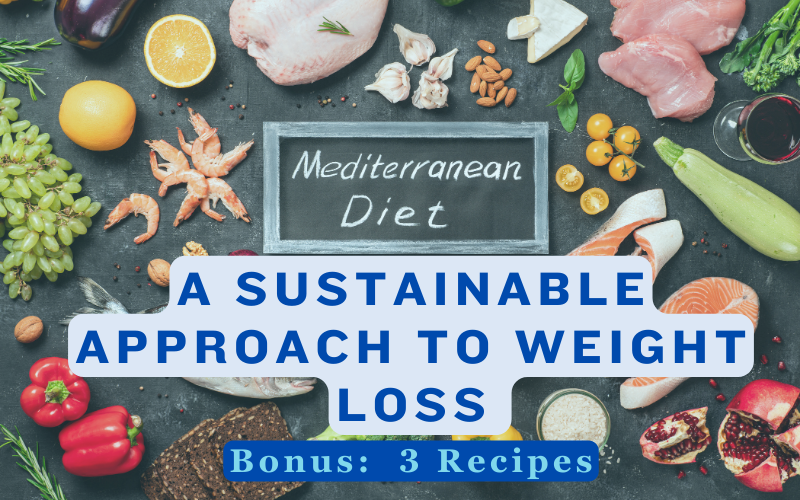The Mediterranean Eating regimen: A Top to bottom Outline
The Mediterranean diet isn’t simply one more temporary dietary pattern; it addresses a centuries-old culinary and social practice. Starting from the different districts around the Mediterranean Ocean, this diet is an agreeable mix of flavors, surfaces, and healthful advantages. Dissimilar to present-day eating of fewer carbs that emphasizes limitations, the Mediterranean methodology celebrates overflow — particularly of supplements thick food sources like new organic products, mixed greens, tomatoes, entire grains, nuts, fish, and poultry. Limiting handled food varieties and sugars while stressing regular fixings gives an outline to manageable sustenance, advancing actual well-being as well as mental prosperity and local area holding [1].
Table of Contents
Mediterranean Way of Life: Something Beyond Food
Past the plate, the Mediterranean way of life incorporates a significant appreciation for food as a wellspring of delight, association, and custom. Feasts are not surged; they’re customs. Families and companions assemble around tables loaded down with bright dishes, encouraging bonds and shared encounters. Occasional eating is vital, guaranteeing newness, flavor, and ideal supplement admission. Moreover, actual work, customary rest, and stress the executives structure essential parts, making a comprehensive biological system of well-being and satisfaction [2].

The Logical Underpinnings: A Vigorous Sponsorship for Weight Reduction
The Mediterranean eating regimen’s recognition is reinforced by plenty of thorough, logical examinations. For instance, the milestone concentrated on the New Britain Diary of Medication enlightened weight reduction as well as featured enhancements in cardiovascular well-being markers among disciples [1]. Monounsaturated fats, dominatingly tracked down in olive oil, offer cardiovascular security, while omega-3 unsaturated fats, plentiful in fish, battle aggravation, and back mind well-being. These dietary forces can be reckoned to synergize to establish a metabolic climate helpful for weighing the board and, in general, imperativeness [3].
Comprehensive Wellbeing Past Weight: A Complex Methodology
The Mediterranean eating regimen’s benefits stretch out a long way past the waistline. Its mitigating properties battle oxidative pressure, diminishing the rate of constant illnesses. Some benefits associated to Mediterranean diet include:
- Cardiovascular Health: One of the most recognized benefits of the Mediterranean diet is its positive impact on heart health. The diet emphasizes consuming heart-healthy fats, such as olive oil, nuts, and fatty fish, which can help reduce LDL cholesterol levels, lower blood pressure, and decrease the risk of heart disease and stroke [1].
- Reduced Risk of Chronic Diseases: The Mediterranean diet is associated with a lower risk of developing chronic diseases, including type 2 diabetes [4]. Its emphasis on whole foods, fiber-rich fruits, vegetables, and whole grains helps regulate blood sugar levels, improve insulin sensitivity, and reduce the risk of diabetes.
- Anti-inflammatory Properties: The Mediterranean diet is rich in foods with anti-inflammatory properties, such as fruits, vegetables, nuts, and fatty fish. Consuming these foods can help reduce inflammation in the body, which is linked to various chronic conditions, including arthritis, metabolic syndrome, and certain types of cancer [5].
- Weight Management: The Mediterranean diet is not only nutritious but also effective for weight management and maintenance [6]. Its emphasis on whole foods, lean proteins, healthy fats, and portion control can help individuals achieve and maintain a healthy weight, reducing the risk of obesity-related diseases.
- Improved Cognitive Function: Some research suggests that adhering to the Mediterranean diet may support brain health and cognitive function [7]. The diet’s emphasis on omega-3 fatty acids, antioxidants, and anti-inflammatory foods may help reduce the risk of cognitive decline, Alzheimer’s disease, and other neurodegenerative conditions.
- Longevity: Population studies have consistently shown that individuals following a Mediterranean diet have a longer life expectancy and a reduced risk of premature mortality. The combination of nutrient-dense foods, moderate alcohol consumption (primarily red wine), and a balanced lifestyle contributes to overall longevity and well-being [8]. For further insights on longevity, you may refer to this blog: “Antiaging Supplements: How NAD, NMN, and SIRT 6 Activators Battle Aging“.
- Enhanced Gut Health: The Mediterranean diet promotes a healthy gut microbiome due to its emphasis on fiber-rich foods, fermented dairy products (like yogurt), and prebiotic-rich foods (like garlic and onions) [9]. A healthy gut microbiome is associated with improved digestion, immune function, and overall health.
- Cancer Prevention: Some components of the Mediterranean diet, such as antioxidants, phytonutrients, and anti-inflammatory compounds, may help reduce the risk of certain types of cancer, including breast cancer, colorectal cancer, and prostate cancer [10].

In summary, the Mediterranean diet offers a myriad of health benefits, ranging from cardiovascular protection and improved metabolic health to enhanced cognitive function and longevity. Its emphasis on whole, nutrient-dense foods, healthy fats, lean proteins, and lifestyle factors underscores its role as a sustainable and beneficial dietary pattern for overall health and well-being.
Useful Execution: Creating Your Mediterranean Process
Progressing to the Mediterranean eating routine requires a mix of culinary imagination, informed decisions, and way of life changes. Look into nearby, occasional produce, holding back nothing plate that reflects nature’s abundance. Consolidate assorted spices and flavors to lift flavors without depending on unreasonable salts or sugars. Investigate Mediterranean foods through cookbooks, classes, or culinary undertakings, embracing the locale’s gastronomic variety. Match dietary changes with normal active work — be it lively strolls, yoga, or swimming — to intensify medical advantages and cultivate a synergistic way of life.
Tending to and Beating Possible Detours: A Proactive Methodology
While the Mediterranean diet boasts a plethora of health benefits, every individual’s journey may encounter unexpected challenges or detours. Whether it’s grappling with nutritional gaps, adapting to unfamiliar flavors, or navigating social and communal settings, proactive strategies can pave the way for continued success. Here’s how to address and overcome these potential obstacles:
1. Educate Yourself with Credible Resources:
Knowledge is empowering. Arm yourself with trustworthy information about the Mediterranean diet. Delve into reputable books, academic journals, or online resources that elucidate its principles, benefits, and practical applications. Consider consulting with registered dietitians or nutritionists who specialize in Mediterranean nutrition. Their expertise can provide personalized insights, tailored recommendations, and actionable strategies to optimize your dietary journey.
2. Engage with Community Groups and Forums:
The journey towards adopting the Mediterranean lifestyle is more enriching when shared. Join local community groups, online forums, or social media communities dedicated to Mediterranean cuisine and culture. These platforms offer invaluable opportunities to connect with like-minded individuals, exchange experiences, swap recipes, and glean insights from seasoned practitioners. Engaging with a supportive community fosters camaraderie, motivation, and a sense of belonging, making the transition smoother and more enjoyable.
3. Celebrate Incremental Achievements:
Embrace the power of small wins. Celebrate each milestone, no matter how minor, as it signifies progress and commitment. Whether it’s successfully incorporating a new Mediterranean dish into your repertoire, resisting processed temptations, or consistently practicing mindful eating, acknowledge and reward your efforts. Recognizing these achievements boosts self-confidence, reinforces positive behaviors, and sustains momentum, propelling you toward long-term success.
4. Prioritize Adaptability and Sustainability:
Embracing the Mediterranean lifestyle is a journey, not a destination. Recognize that flexibility and adaptability are integral to sustained progress. While it’s essential to adhere to core principles, allow room for experimentation, exploration, and evolution. Tailor the diet to align with your individual preferences, cultural considerations, and lifestyle constraints. Emphasize sustainability over perfection, fostering a balanced, realistic approach that resonates with your unique needs and circumstances.
5. Seek Professional Guidance When Needed:
If challenges persist or become overwhelming, don’t hesitate to seek professional guidance. Collaborate with healthcare professionals, nutritionists, or dietitians who possess expertise in Mediterranean nutrition. They can provide personalized assessments, devise tailored strategies, address specific concerns, and offer ongoing support. By leveraging their knowledge and insights, you can navigate challenges more effectively, optimize outcomes, and cultivate a resilient and fulfilling Mediterranean lifestyle.
By adopting a proactive, informed, and adaptable approach, you can navigate potential detours with confidence, resilience, and grace, ensuring a rewarding and sustainable Mediterranean journey.
Last Reflections: An Immortal Obligation to Prosperity
In conclusion, The Mediterranean Diet it is more than just food, It’s a Lifestyle and Legacy.
The essence of the Mediterranean diet extends far beyond mere culinary guidelines; it encapsulates a holistic philosophy—a commitment to holistic well-being that intertwines tradition, scientific evidence, and community engagement. Let’s delve deeper into the multifaceted layers that make the Mediterranean diet a profound journey of discovery and transformation:
1. Rooted in Tradition:
At its core, the Mediterranean diet is steeped in rich cultural traditions dating back centuries. It reflects the culinary practices, agricultural methods, and communal values of diverse Mediterranean communities—from the sun-drenched coasts of Greece and Italy to the rustic villages of Spain and Morocco. These traditions, passed down through generations, emphasize the importance of seasonal, local, and minimally processed foods, fostering a deep connection with the land, sea, and heritage.
2. Supported by Science:
Beyond tradition, the Mediterranean diet is bolstered by a robust body of scientific research. Numerous studies have elucidated its myriad health benefits, ranging from cardiovascular health and weight management to cognitive function and longevity. The diet’s emphasis on nutrient-dense foods, rich in antioxidants, healthy fats, fiber, and phytonutrients, creates a synergistic blend that promotes optimal health, reduces inflammation, and mitigates the risk of chronic diseases.
3. Fostering Community and Connection:
The Mediterranean diet transcends individual nutrition; it fosters community, connection, and conviviality. Meals are not solitary endeavors but communal celebrations, bringing families, friends, and neighbors together. Shared dishes, lively conversations, and cherished traditions create bonds, forge memories, and cultivate a sense of belonging. This communal approach to eating enhances mental well-being, reduces stress, and reinforces social ties, reinforcing the diet’s holistic emphasis on mind-body harmony.
4. Embracing an Evolving Journey:
Embracing the Mediterranean diet is akin to embarking on an evolving journey of self-discovery, growth, and transformation. As you navigate its vibrant tapestry of flavors, nutrients, and experiences, you cultivate a deeper understanding of food’s role in shaping health, happiness, and longevity. Each meal, recipe, and culinary experiment becomes a stepping stone, enriching your palate, expanding your culinary repertoire, and enhancing your overall well-being.
5. A Legacy of Health, Harmony, and Enduring Vitality:
Ultimately, adopting the Mediterranean diet transcends dietary choices; it symbolizes a legacy—a timeless tradition of health, harmony, and enduring vitality. By embracing its principles, you align with a lifestyle rooted in balance, moderation, and respect for both the environment and the intricate interplay between food, culture, and community. This legacy serves as a beacon, guiding individuals towards a life imbued with purpose, passion, and profound well-being.
In essence, the Mediterranean diet encapsulates a multifaceted journey—a harmonious blend of tradition, science, and community. By embracing its principles with an open heart and discerning palate, you embark on a transformative path, enriching not just your diet but your entire life, fostering a legacy of health, harmony, and enduring vitality.
Samples of Mediterranean Diet Meals and How To Prepare
Mediterranean Breakfast:
Greek Yogurt Parfait with Fresh Berries and Honey
Ingredients:
– 1 cup of Greek yogurt (unsweetened)
– A handful of mixed fresh berries (such as strawberries, blueberries, and raspberries)
– 1 tablespoon of raw honey
– A sprinkle of chopped nuts (like almonds or walnuts)
– A dash of cinnamon (optional)
Instructions:
1. In a bowl or glass, layer Greek yogurt followed by a drizzle of honey.
2. Add a layer of mixed berries on top.
3. Repeat the layering process until you fill your serving dish.
4. Sprinkle chopped nuts and a dash of cinnamon over the top.
5. Enjoy this creamy, tangy, and sweet parfait that’s rich in protein, antioxidants, and healthy fats.
Mediterranean Lunch:
Mediterranean Chickpea Salad with Olive Oil Dressing
Ingredients:
– 1 can (15 oz) chickpeas (garbanzo beans), drained and rinsed
– 1 cucumber, diced
– 1 red bell pepper, diced
– 1/2 red onion, finely chopped
– 1/4 cup fresh parsley, chopped
– 1/4 cup Kalamata olives, pitted and sliced
– 1/3 cup feta cheese, crumbled
– Dressing: 3 tablespoons extra-virgin olive oil, 1 tablespoon lemon juice, 1 garlic clove (minced), salt, and pepper to taste.
Instructions:
1. In a large mixing bowl, combine chickpeas, cucumber, bell pepper, red onion, parsley, and Kalamata olives.
2. In a separate small bowl, whisk together olive oil, lemon juice, minced garlic, salt, and pepper to make the dressing.
3. Pour the dressing over the salad and toss gently to combine.
4. Sprinkle crumbled feta cheese over the top.
5. Serve chilled or at room temperature as a refreshing and filling Mediterranean lunch.
Mediterranean Dinner:
Grilled Lemon Herb Chicken with Quinoa Tabbouleh
Ingredients:
– For the Chicken:
– 2 boneless, skinless chicken breasts
– Zest and juice of 1 lemon
– 2 garlic cloves, minced
– 2 tablespoons fresh herbs (such as rosemary, thyme, or oregano), chopped
– 3 tablespoons extra-virgin olive oil
– Salt and pepper to taste
– For the Quinoa Tabbouleh:
– 1 cup cooked quinoa
– 1 cucumber, finely diced
– 1 cup cherry tomatoes, quartered
– 1/2 cup fresh parsley, chopped
– 1/4 cup fresh mint leaves, chopped
– 1/4 cup red onion, finely chopped
– Zest and juice of 1 lemon
– 2 tablespoons extra-virgin olive oil
– Salt and pepper to taste
Instructions:
1. For the Chicken: In a bowl, whisk together lemon zest, lemon juice, minced garlic, chopped herbs, olive oil, salt, and pepper. Marinate chicken breasts in this mixture for at least 30 minutes.
2. Preheat the grill or grill pan over medium-high heat. Grill chicken for about 6-7 minutes on each side or until fully cooked.
3. For the Quinoa Tabbouleh: In a large mixing bowl, combine cooked quinoa, diced cucumber, cherry tomatoes, chopped parsley, mint leaves, and red onion.
4. In a separate small bowl, whisk together lemon zest, lemon juice, olive oil, salt, and pepper to make the dressing. Pour over the quinoa mixture and toss to combine.
5. Serve the grilled lemon herb chicken alongside the quinoa tabbouleh for a hearty and flavorful Mediterranean dinner.
These recipes incorporate typical Mediterranean ingredients and flavors, providing a balanced mix of proteins, healthy fats, fiber, vitamins, and minerals. Enjoy your Mediterranean-inspired meals!
References:
[1] Estruch R, Ros E, Salas-Salvado J, Covas MI, Corella D, Aros F, et al. Primary Prevention of Cardiovascular Disease with a Mediterranean Diet Supplemented with Extra-Virgin Olive Oil or Nuts. N Engl J Med. 2018;378(25):e34. https://www.ncbi.nlm.nih.gov/pubmed/29897866. .
[2] Sofi, F., et al. (2010). Adherence to Mediterranean Diet and Health Status: Meta-analysis. British Medical Journal, 337, 1344. https://pubmed.ncbi.nlm.nih.gov/18786971/
[3] Schwingshackl, L., & Hoffmann, G. (2014). Mediterranean Dietary Pattern, Inflammation and Endothelial Function: A Systematic Review and Meta-analysis of Intervention Trials. Nutrition, Metabolism, and Cardiovascular Diseases, 24(9), 929-939. https://www.sciencedirect.com/science/article/abs/pii/S0939475314001094
[4] Salas-Salvadó, J., Bulló, M., Babio, N., Martínez-González, M. Á., Ibarrola-Jurado, N., & Basora, J. (2011). Reduction in the Incidence of Type 2 Diabetes with the Mediterranean Diet. Diabetes Care, 34(1), 14-19. https://pubmed.ncbi.nlm.nih.gov/20929998/
[5] Casas, R., Sacanella, E., Urpí-Sardà, M., Corella, D., Castañer, O., Lamuela-Raventós, R. M., … & Estruch, R. (2014). Long-Term Immunomodulatory Effects of a Mediterranean Diet in Adults at High Risk of Cardiovascular Disease in the PREvención con DIeta MEDiterránea (PREDIMED) Randomized Controlled Trial. The Journal of Nutrition, 144(4), 562-571. https://www.semanticscholar.org/paper/Long-Term-Immunomodulatory-Effects-of-a-Diet-in-at-Casas-Sacanella/307cf231e225a48eff2e7fd38fec42a2bb9e7a6c
[6] Esposito, K., Kastorini, C. M., Panagiotakos, D. B., & Giugliano, D. (2011). Mediterranean Diet and Weight Loss: Meta-Analysis of Randomized Controlled Trials. Metabolic Syndrome and Related Disorders, 9(1), 1-12. https://www.ncbi.nlm.nih.gov/books/NBK81688/
[7] Psaltopoulou, T., Sergentanis, T. N., Panagiotakos, D. B., Sergentanis, I. N., Kosti, R., & Scarmeas, N. (2013). Mediterranean Diet, Stroke, Cognitive Impairment, and Depression: A Meta-Analysis. Annals of Neurology, 74(4), 580-591. https://onlinelibrary.wiley.com/doi/10.1002/ana.23944
[8] Trichopoulou, A., Costacou, T., Bamia, C., & Trichopoulos, D. (2006). Adherence to a Mediterranean Diet and Survival in a Greek Population. The New England Journal of Medicine, 348(26), 2599-2608. https://pubmed.ncbi.nlm.nih.gov/12826634/
[9] De Filippis, F., Pellegrini, N., Vannini, L., Jeffery, I. B., La Storia, A., Laghi, L., … & Ercolini, D. (2016). High-Level Adherence to a Mediterranean Diet Beneficially Impacts the Gut Microbiota and Associated Metabolome. Gut, 65(11), 1812-1821. https://pubmed.ncbi.nlm.nih.gov/26416813/
[10] Schwingshackl, L., & Hoffmann, G. (2016). Adherence to Mediterranean Diet and Risk of Cancer: An Updated Systematic Review and Meta-Analysis. Nutrients, 8(3), 168. https://pubmed.ncbi.nlm.nih.gov/28954418/






Pingback: Intermittent Fasting 101-The Science-Backed Approach to Sustainable Weight Loss - Healthy Living Journey